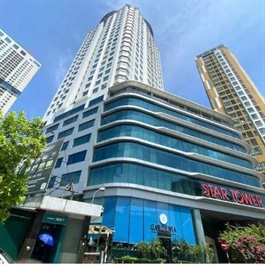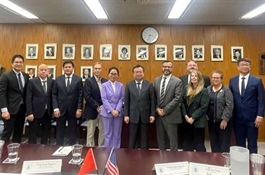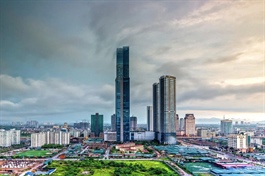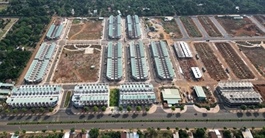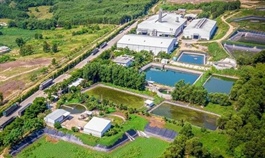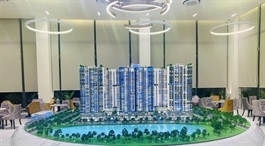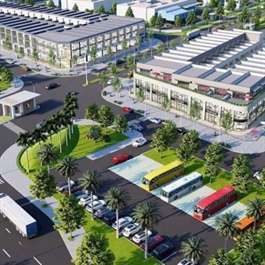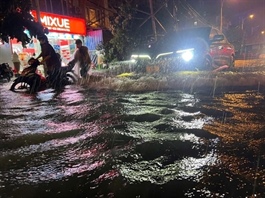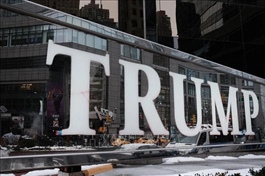Reform adds to strong M&A outlook
Reform adds to strong M&A outlook
The flow of capital from foreign investors into Vietnam’s real estate market has remained positive, with multiple transactions currently under negotiation. Seck Yee Chung, partner of Baker McKenzie Vietnam, discussed with VIR’s Bich Ngoc on the market’s outlook.

How do you evaluate foreign direct investment (FDI) flows into the real estate market in the first eight months?
According to the Ministry of Planning and Investment, in the first eight months of 2024, Vietnam saw a total implemented FDI capital of $14.15 billion. Of this, $2.8 billion was registered for capital contributions and share purchases, with 57 real estate deals alone. The total amount of capital for contributions and share purchases in real estate exceeded $811 million.
Among the notable merger and acquisition (M&A) transactions, Singaporean fund Mapletree Logistics Trust in February invested $68.4 million to acquire two grade-A warehouses in Binh Duong and Hung Yen provinces. These locations have become key logistics hubs recently, reflecting foreign investors’ growing interest in Vietnam’s industrial real estate segment.
In April, Kim Oanh Group partnered with Sumitomo Forestry, Kumagai Gumi, and NTT Urban Development to launch The One World project, a 50-hectare residential area in Binh Duong province, with a total investment exceeding $1 billion. This ambitious project highlights the increasing collaboration between Vietnamese and international companies in high-value residential projects.
Additionally, in June, Japan’s Nishi Nippon Railroad acquired a 25 per cent stake in the 45 hectare Paragon Dai Phuoc project from Nam Long Group for approximately $26 million. This deal further demonstrates Japan’s growing interest in Vietnam’s real estate market, especially in large-scale urban and suburban developments.
What significance do these recent M&A cases have?
These promising deals, coupled with the positive FDI statistics, suggest that the Vietnamese real estate market remains a bright spot for foreign investors. This attractiveness is driven by several factors, including Vietnam’s strong long-term economic growth prospects, the relocation of global manufacturing to the country, rising GDP, and robust urbanisation trends. The increasing demand for industrial real estate for production to logistics facilities and warehouses, reflects Vietnam’s growing role as a regional manufacturing hub.
Furthermore, residential real estate is seeing sustained interest, particularly in large urban projects. The collaboration between local developers and foreign investors in projects like The One World highlights the growing sophistication and scale of residential developments. Such projects cater to the rising middle class and the demand for modern housing solutions in Vietnam’s rapidly urbanising cities.
However, while the market is attractive, there are still areas where Vietnam can improve to further facilitate foreign investors’ operations and pull in more large-scale investments. The current licensing processes remain complex and time-consuming, and there are ambiguities in certain regulations that create uncertainty for foreign businesses. Establishing a clearer and more consistent legal framework, particularly with regard to foreign investment regulations, would greatly benefit the market.
Despite these challenges, it’s important to note that the government has made significant progress in improving the legal framework.
Two revised laws were enacted in August to open more doors for FDI. How will they impact M&A activities?
The recent enactment of the new Land Law, the Real Estate Business Law, and other legal reforms are expected to significantly boost M&A activities in the real estate sector. These laws aim to streamline legal procedures, increase the supply of real estate, and create new opportunities for foreign investors.
One key change in the 2024 Land Law is its clearer definition of foreign-invested enterprises (FIEs). According to the law, companies that do not need to follow foreign investment procedures under the Investment Law will not be classified as FIEs, allowing them to enjoy the same rights as domestic companies. This change could facilitate real estate transactions for companies with minority foreign ownership and eliminate some of the bureaucratic hurdles that have historically slowed down such deals.
Another important change is that FIEs are now allowed to receive land use rights directly in industrial parks, economic zones, and high-tech zones. Previously, under the 2013 Land Law, FIEs faced restrictions in acquiring land use rights, which limited their ability to fully participate in Vietnam’s booming industrial real estate market.
The new laws also provide clearer guidelines for land expropriation. District-level people’s committees are now authorised to issue land expropriation decisions, even for projects involving industrial areas. This change is expected to simplify the expropriation process, as previously some cases required provincial-level committees to intervene, adding unnecessary delays.
The 2024 Land Law also addresses the issue of land use term extensions. Under the previous law, there were no clear criteria for extending land use terms, creating uncertainty for foreign investors. The new law allows investors to apply for extensions before the current term expires, provided that the project duration has been approved by the authorities. This change provides greater clarity and assurance for foreign investors looking to make long-term investments in Vietnam’s real estate sector.
The introduction of an annual land pricing table by provincial authorities is another significant change. This new system replaces the previous five-year price brackets issued by the central government, ensuring that land valuations are more reflective of current market conditions. While this change should lead to more market-sensitive pricing, it could also present challenges for businesses and local authorities as they adapt to the new system.
The 2023 Real Estate Business Law also brings noteworthy reforms. It legally recognises new property types, such as condotels and officetels, which have been in legal limbo under the 2013 law. By providing clear guidelines for the sale and pre-sale of separate floor areas within buildings, the new law legitimises certain practices that have already been adopted in the market.
Additionally, the 2023 Real Estate Business Law allows developers to transfer real estate projects before obtaining land use rights certificates, provided they have fulfilled their financial obligations to the government. This change is expected to streamline the transaction process.
What is the outlook for M&A in the real estate market?
The outlook remains positive. The government’s ongoing efforts to improve the legal framework and create a stable investment environment are expected to attract more foreign investors in the coming years. The reforms introduced by the Land Law and Real Estate Business Law are likely to enhance transparency, reduce bureaucratic hurdles, and encourage more M&A deals.
Vietnam’s real estate market continues to be a focal point for FDI, particularly in the industrial and residential sectors. The country’s favourable policies, strong economic growth, and long-term investment potential make it an attractive destination for foreign investors. As the market evolves, investors who can navigate the regulatory landscape and anticipate changes in the legal framework will be well-positioned to capitalise on the opportunities in Vietnam’s real estate sector.
We expect M&A deals to remain a key component of Vietnam’s real estate, driving growth and fostering collaboration between local developers and foreign investors. The recent legal reforms provide a good foundation for continued investment and growth in the sector, ensuring that Vietnam remains an attractive destination for foreign capital.



